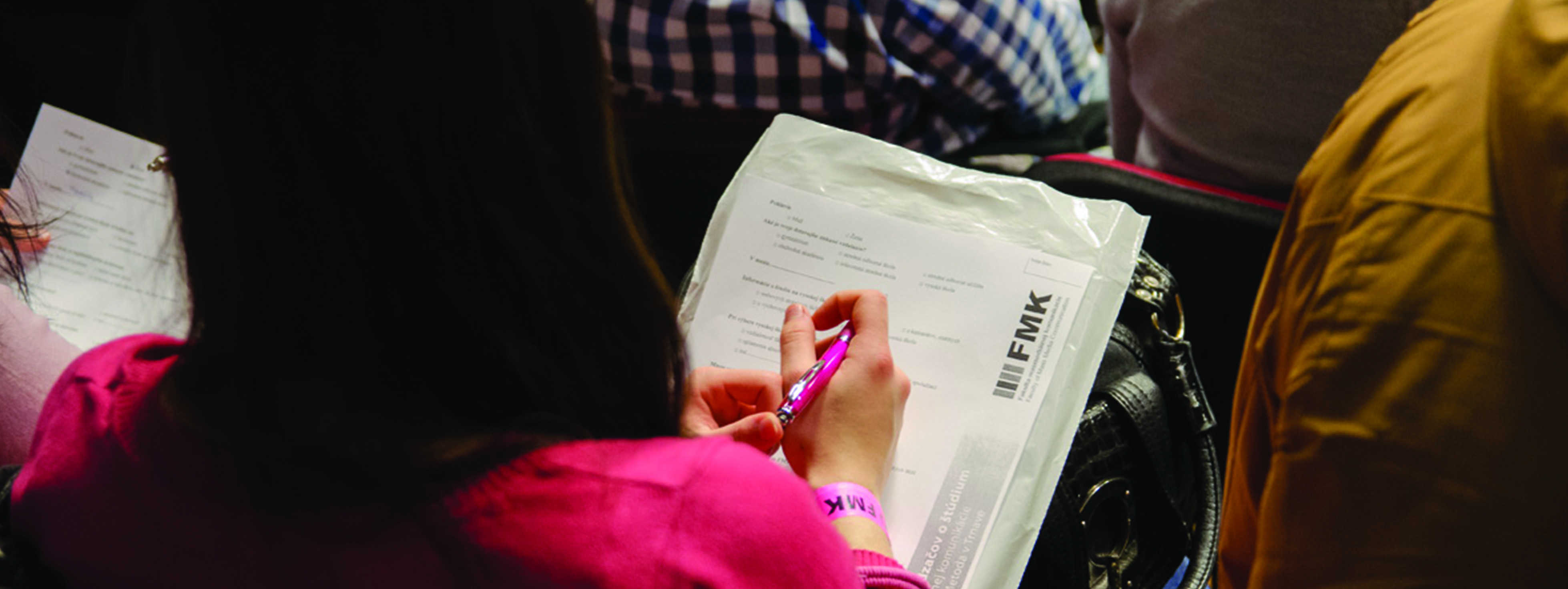The Faculty of Mass Media Communication at the University of Ss. Cyril and Methodius in Trnava (FMK) provides higher education and organizes courses aligned with this mission. We support creative scientific research and artistic production. The main aim of FMK is to spread knowledge, to develop overall education of the society in the field of mass media studies and to support the development of personal and professional qualities of academic staff and students.
If you are an international student, please find our International Student Guide:
FMK INTERNATIONAL STUDENT GUIDE and our current brochure FMK BROCHURE.
Video of FMK Doors Open Days 2022
If you would like to find out more about our international cooperation, please click here. For more information about study in English at our faculty, please contact Lenka Labudová: lenka.labudova(at)ucm.sk
About
General Description
Our university is a modern, dynamically growing and ambitious institution that was established in 1997. The Faculty of Mass Media Communication is the fundamental and the most important faculty of the university. It also has a specific position in the Slovak education market – in particular – for its uniqueness to be the largest and the most complex media school in the country. It is considered to be the country’s most desired school among students of media studies. The demand for graduates of our faculty ranks the institution among ten most prestigious faculties in Slovakia.
The faculty is also a research-development institution participating in scientific research in Slovakia and abroad. It cooperates with educational, research, artistic and art institutes.
The faculty is involved in solving many international scientific and research tasks. It also runs the international center of media education. FMK UCM established the International Center of Media Literacy in 2010. This center has significantly contributed to the fact that Slovakia climbed from 23th up to 8th place among EU countries in media literacy level.
FMK UCM has gained prestige in the international field, too; based on the proposal of FMK, the degree „doctor honoris causa“ were granted to famous world science authorities such as Philip Kotler (USA), prof. Zygmunt Bauman (UK) or prof. Dr. Jur. Peter Bruck, PhD. M.A. (Austria) and others.
Management of the Faculty
Dean of FMK UCM
Vice-deans
Head of academic senate
Faculty secretary

Study Programs
Study Programs
Do you want to work in a newspaper office, television, or in marketing departments in the future? To work as editors, anchors or copywriters? Long experience in the field of mass media and marketing communication have enabled us to create a wide range of study programmes, and therefore, our graduates can be easily placed on the labour market. The Faculty of Mass Media Communication offers education in Bachelor’s, Master’s and Doctoral degrees in several programmes in the field of mass media studies. The programmes are offered in both full-time and part-time forms. The faculty offers the following programmes:
- mass media communication, (bachelor, master, PhD.)
- marketing communication, (bachelor, master, PhD.)
- applied media studies, (bachelor, master)
- media relations (in English language, bachelor)
- theory of digital games (bachelor, master, PhD.)
Media relations (Bachelor´s Degree)
The term media relations is understood by professional public as a regular communication with media via maintaining good relationships with journalists who are interested in issues of company or public institution. The neutral, positive or negative publicity resulting from critical situations is primarily the consequence of quality of such relationships. Relations with media are based on production and providing the information. The aim of this kind of information is to attract attention of addressed media and subsequently the interest of media content recipients about certain topic regarding the company, organization, its products or services. The term media relations in its narrow sense may also represent creating good relationships with other subjects involved in media communication. Study program media relations is taught in English language as the only program at our faculty.
The graduate of Media Relations is profiled as an expert in communication in the creation of media relations and masters a wide range of knowledge from a number of disciplines, primarily from the areas of mass media and marketing communication, broadened by specific courses of the media relations programme, as well as communication skills and competences. The graduates can find their career opportunities in publishing houses, editorial offices of various types of media, marketing and PR departments, public sector institutions, PR agencies, media agencies, marketing agencies, editorial systems of print, audio, audiovisual and internet media and as media relation experts. The programme is offered in the English language.
Where can the graduates find their career opportunities?
- media relations expert,
- officer in a publishing house,
- PR executive officer,
- media agency executive officer.
Catalogue of Courses 2022/2023
Mass Media Communication (Bachelor’s Degree)
The graduates of this programme will gain knowledge about the theory of communication, philosophy, aesthetics and history of culture. They will become acquainted with theories of mass media, their system and structure, economics and management, individual areas of journalism and their development. They will gain practical knowledge about technology of the creation of informative, cultural and artistic communications. They will learn how to mediate these communications through audiovisual, auditive or visual channels using up-to- date electronic media such as television, radio, video and the internet. They will also gain knowledge about media information systems. They will acquire additional knowledge from the areas of psychology, sociology, ethics, political science, law and also a wide linguistic knowledge and skills in two foreign languages.
Where can the graduates find their career opportunities?
- audio engineer,
- cameraman,
- graphic artist,
- photo reporter,
- editor,
- PR manager.
Mass Media Communication (Master’s Degree)
The programme has an interdisciplinary character based on theory of culture, aesthetics, theory and history of a selected discipline and theory of artistic genres. Starting with the forth year, the graduates of Mass Media Studies deepen their scientific knowledge in dramaturgy, directing, media and psychology, in scientific, internet and multi-media communication. The study of verbal and communication technologies, authorial creation and self-presentation is also a part of the graduate’s profile. In their education, individual departments closely cooperate with the institutes of SAV (Slovak Academy of Sciences), other faculties of the UCM and the media organizations. The professionals from the media also collaborate in the educational process and technological equipment of media institutions is used.
Where can the graduates find their career opportunities?
- journalist,
- reporter,
- editor,
- media specialist,
- press officer,
- copywriter.
Mass Media Communication (Doctoral Degree)
The graduates of Mass Media Communication in the Doctoral degree will acquire a wide range of theoretical knowledge from the respective field. Regarding the fact that the study is multidisciplinary, the acquired knowledge will include philosophy, sociology, law, verbal and artistic creation with a focus on the media. Theoretical knowledge from the fields of social and mass media communication is the starting point for the educational processes. Emphasis is paid to the formation of practical skills and competences, which will enable the graduate to enter the social and mass media systems both actively and creatively. The graduate of the Doctoral study of mass media communication has an opportunity to get acquainted with methodology of scientific work, to gain the most up-to-date information about the current state of scientific knowledge, and through his own independent scientific work can broaden the current level of knowledge in the theory and practice of mass media communication.
Marketing Communication (Bachelor’s Degree)
The graduates of the study programme will gain basic economic, philosophical, technical and media knowledge. The applied part of the study includes essentials of media informatics, marketing, management and theory of the market economy. The role of the study is to educate professionals who will be able to deal with tasks in the fields of media management and marketing of advertising and marketing agencies with regard to media-marketing aspects. The graduates will gain basic knowledge about the function and roles of marketing-media specialists as well as in the field of creating marketing strategies of media products.
Where can the graduates find their career opportunities?
- marketing specialist,
- marketing manager of a small company or non-profit organisation,
- sales manager,
- online marketer.
Marketing Communication (Master’s Degree)
The knowledge of the programme’s graduate integrates the knowledge of modern information technologies with knowledge of the market and communication skills. Therefore, it has an interdisciplinary character. The graduate’s knowledge conditions the laws of transformation of communication-marketing strategies to utility values. The graduate is familiar with the substance of the creation of media campaigns and communication strategy, he masters technologies such as the internet, teletext, direct mail and others. He has knowledge about the nature of media-marketing operations, scientifically proven procedures in the fields of publicity and advertising with regard to their theory, production and management. The graduate has knowledge and skills based on a wide theoretical and technological basis such as communication systems, economic and media analysis and the psychology of communication processes.
Where can the graduates find their career opportunities?
- marketing manager,
- producer,
- advertising agency worker,
- PR specialist,
- media institutions manager.
Marketing Communication (Doctoral Degree)
The graduate of Marketing Communication will acquire a wide range of theoretical knowledge from the fields of philosophy, sociology, marketing, management and marketing communication. In the field of applied sciences, acquisition of categorical and notional apparatus of communicational sciences, theory of marketing communication, sociology and marketing communication strategies is expected. Besides theoretical knowledge, the graduate is supposed to develop the skills of independent critical thinking about marketing communication, mastering of the methodology of research and acquisition of practical skills in strategic coordination of media communications. The starting point for the educational process is the newest theoretical knowledge in the fields of mass and marketing communications as well as the most current interpretation strategies. The emphasis is given on the formation of skills and competences which will enable the graduate to actively and creatively enter the social and marketing communication systems. The graduate will be able to compare diverse types of media information.
Applied Media Studies (Bachelor’s Degree)
The graduates of Applied Media Studies are profiled as experts in the competent use of media and new communication technologies in specific work positions and other life activities of individuals in various spheres of social reality. The graduate is also profiled as an expert in programmes of intentional formation of media competence of individuals in the system of educational institutions of both formal and informal character, in the system of media institutions or institutions from related social disciplines. The graduates will acquire practical skills in the creation and production of print, audiovisual and digital media content. Particular emphasis is placed on digital educational games, educational audiovisual programmes as well as the creation of various innovative children and youth programmes.
Where can the graduates find their career opportunities?
- digital media expert,
- public service media workers,
- expert in online risks prevention,
- expert in creation of children and youth programmes,
- lecturer in training courses.
Applied Media Studies (Master’s Degree)
The graduates will become experts in managing media projects and preparation of programmes in various formats (TV and radio programmes, e-learning courses, videos, web projects, mobile applications, digital games, etc.). They will know their strengths and weaknesses, but also the opportunities and risks they bring. They can also use the gained knowledge and experience in practical training and education.
Where can the graduates find their career opportunities?
- media projects manager,
- digital games consultant,
- creator of educational programmes and didactic aids,
- producer of children and youth programmes,
- specialist in media use in the public and private sectors,
- lecturer of media, information and digital education.
Theory of Digital Games (Bachelor’s Degree)
The graduates of the programme are equipped with a basic summary of theoretical and practical knowledge and skills on the basis of which they are competent in: subject to the description and analysis of individual typological variants and means of digital communication, assess the level of acceptance of the influence of socio-cultural, psychological and technological factors on the creation of digital games and incorporate them accordingly, work individually in projecting and programming of digital games in cyberspace, master skills and competences from the fields of art graphics, digital graphics, graphic projection based on up-to-date technologies (2D, 3D animation, special light effects, textures, object modelling, projection of virtual environments), use acquired knowledge as a creator of sounds in digital games, i.e. compose sound with the use of digital technologies, modify space sound, register voice changes, master the procedures of postproduction process in the implementation of sound elements and finally, manage all stages of realizations of projects of digital games.
Where can the graduates find their career opportunities?
- dramaturgist,
- advertising creator focused on the segment of the computer market,
- creative expert,
- designer.
Theory of Digital Games (Master’s Degree)
The graduates from the master´s degree study programme called Theory of Digital Games acquire theoretical knowledge, practical experience and skill in the given area. They will be able to hold the posts of managers, create, manage and coordinate projects and researches in the digital sphere and apply the results in practice. They can find employment as specialists in the digital games production, project managers, directors, analysts of digital games production and researchers in digital games production.
Where can the graduates find their career opportunities?
- specialist in digital games production,
- project manager,
- director,
- analyst of digital games production,
- researcher in digital games production,
- screenwriter.
Theory of Digital Games (Doctoral Degree)
The content of the Theory of Digital Games study programme corresponds to and is based on the content of the study field of Mass Media Studies. The study field of Mass Media Studies focuses on training of experts in traditional print and electronic media, but also on new forms of communication, digital media and multimedia. Digital games have become a widespread medium representing new forms of digital communication and fitting into the content of the study field of Mass Media Studies. The core of the Theory of Digital Games study programme at the PhD. level consists of knowledge from the field of marketing and mass media communication, game theory and the interaction between the media and the media market (games in socio-cultural and media environment, typology of digital games audiences, research methods in digital games, marketing communication strategies in the field of digital games). The Theory of Digital Games study programme contains the following optional subjects: Audiovisual Means of Digital Games, Educational Aspects of Digital Games, Reflection of Postmodern Art in Digital Games, Graphics and Sound of Digital Games, etc. Proper completion of doctoral studies requires: passing the theoretical part of the study (lectures), research activity, passing the dissertation examination and the dissertation thesis defence. The study in doctoral degree is based on an individual study plan which is set up by the supervisor and the doctoral student at the beginning of the study on the basis of general study plans.
Student Life
Student Life
FMK UCM owns the most modern technical equipment, which serves to quality training of the students. Excepting some standard digital technologies and other modern technical equipment, there is also top HD studio, disposing the latest and best quality equipment among central EU countries. It enables to make the production of technically comparable or even better level, comparing to mainstream TV stations in the country.
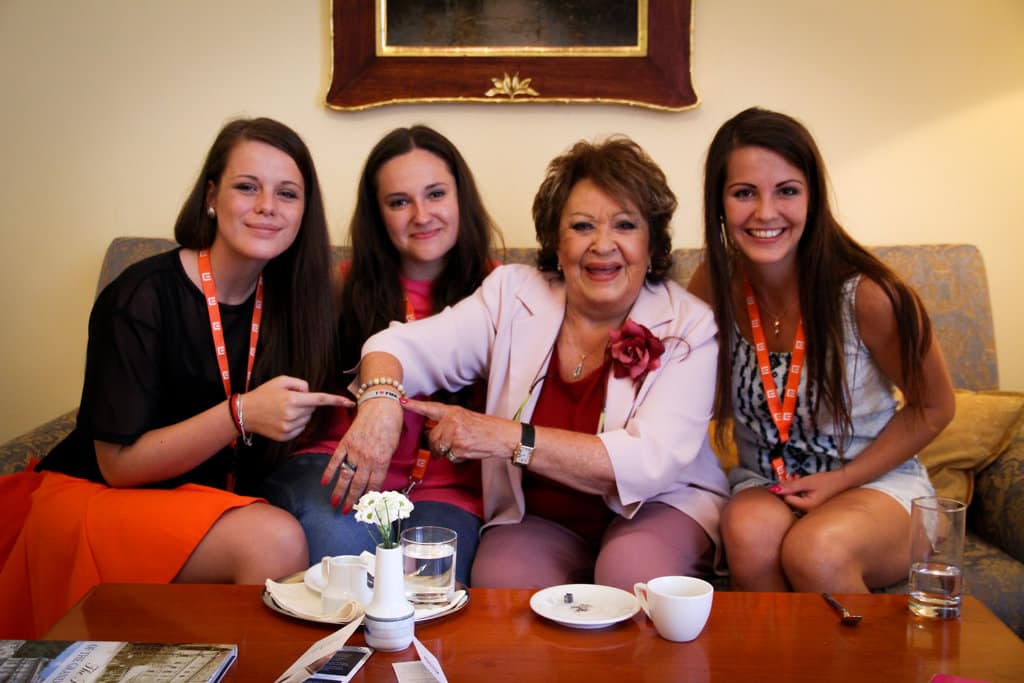
Our students at international movie festival in Carlsbad
There is also a possibility for the students to verify the acquired knowledge in practice, especially within co working centre Pointt, 9 professional cabinets or while working in school media – magazine Atteliér, radio Aetter, FMK TV. The student magazine belongs to top ones in the country for several years, while reaching the first place in this ranking for several years consecutively.
We are proud of publishing various types of unique magazines – artistic revue Muuza and Media Literacy Student Magazin. Muuza was awarded as the most beautiful book of the year in international competition. Media Literacy Student Magazine provides some space for publishing student works in media education field and media literacy.
Our students regularly achieve success in various events and competitions – they were successful twice in national competition „The most beautiful book of year” with a monograph of artistic photos Kone.fmk and Among the raindrops. They are laureates of literary competitions and they gained leadership several times in the competition dealing with the best university student magazine.
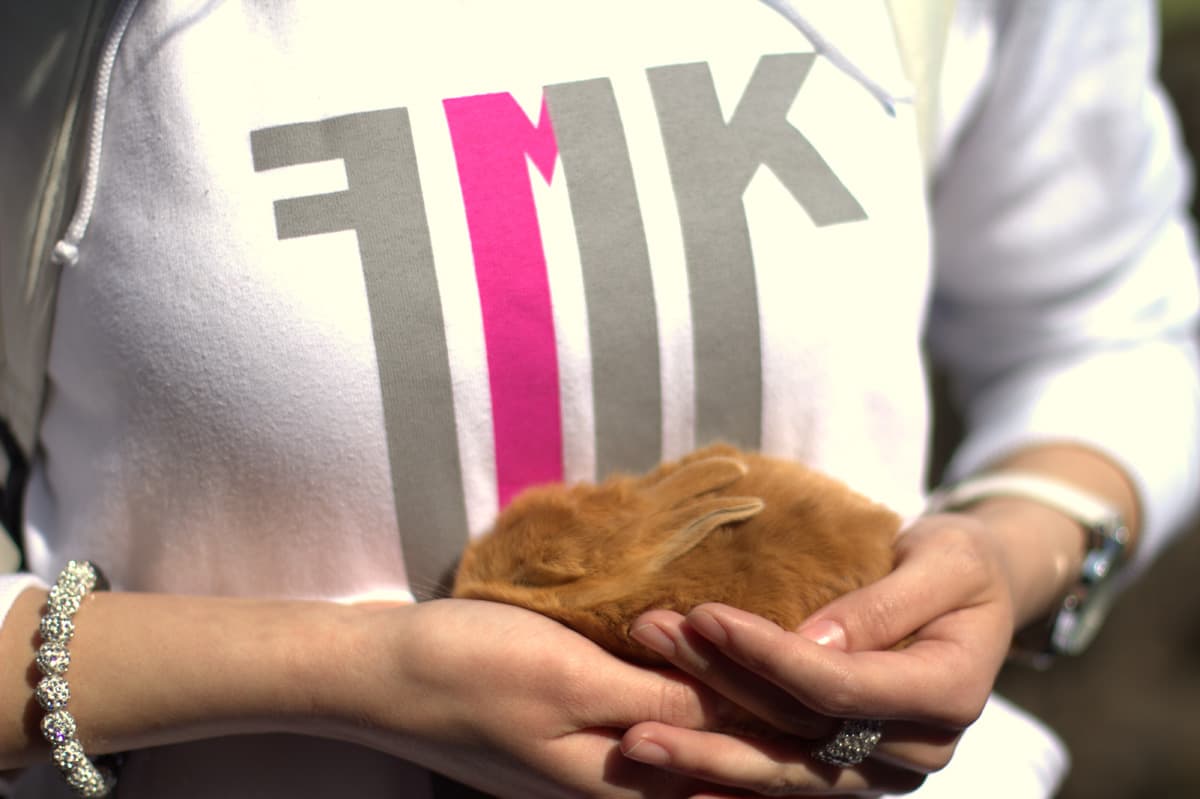
Students‘ projects
Projects for students:
- university magazine Attelier,
- Radio Aetter,
- FMK TV,
- sport events,
- art exhibitions,
- entertainment shows,
- Senator’s party (student party).
International
International Relations Office
The objective of the International Relations Office at the Faculty of Mass Media Communication (FMK) at the University of Ss Cyril and Methodius in Trnava is to develop and coordinate the international activities of both staff and students. The Office is responsible for policy preparation and policy implementation in the field of internationalization. The main tasks are to inform and raise awareness, coordinate, facilitate initiatives on internationalization and international cooperation. This involves providing support and feedback to the University management on staff and student mobility.
Key tasks of the Office include:
- implementing the strategic plan on internationalisation as it affects staff and students;
- preparing and evaluating agreements with international partner universities;
- administering and promoting the Erasmus + programme ;
- administering and promoting staff and student mobility;
- providing information to students and staff on international mobility opportunities.
- international PR and networking, support and follow-up of international contacts at the policy level of FMK.
Maintaining regular contacts with international organisations, embassies and partner universities are also essential tasks of the Office. FMK currently has active academic partnerships with approximately 40 universities from over 15 countries, including Malaysia, the Czech Republic, China, Malta, Germany, Italy, Israel, Poland and Turkey. FMK cooperates with these international institutions on research projects and on student and pedagogical exchanges via the Erasmus and Erasmus + programmes: List Of Partner Institutions
If you want to get to know our current and recent international projects, please click here.
Our commitment to internationalisation results from our ambition to achieve and maintain world-class quality in all that we do. Our goal is to provide all of our students, domestic and international, with a truly international experience at FMK.
Link to international student handbook: FMK INTERNATIONAL STUDENT GUIDE
International relations email address: international(at)fmk.sk
University Cooperation
Currently, FMK UCM cooperates with 32 universities from 15 countries – e. g. France, Germany, USA, Central and Eastern European Countries.
List of universities in frame of Erasmus+ cooperation:
Czech republic
- Univerzita J. A. Komenského Praha, Czech republic
- Česká zemědělská univerzita v Prahe, Czech republic
- Univerzita Karlova v Prahe, Czech republic
- Vysoká škola ekonomie a manažmentu, o.p.s., Praha, Czech republic
- Vysoká škola finanční a správní, Praha, Czech republic
- Univerzita Hradec Králové, Pedagogická fakulta, Hradec Králové, Czech republic
Germany
- Anhalt University of Applied Science, Germany
- Hochschule der Medien, Stuttgart, Germany
- Saarland Universtity, Saarbrücken, Germany
Croatia
- University of Dubrovnik, Croatia
- University of Zagreb, Croatia
- Sveučilište Sjever/University North, Varaždin, Croatia
- University of Applied Sciences B. Zapresic, Zaprešič, Croatia
- J. J. Strossmayer University of Osijek, Osijek, Croatia
- Edward Bernays College, Záhreb, Croatia
Poland
- Stanislaw Staszic University of Applied Sciences in Piła, Poland
- Czestochowa University of Technology, Poland
- Poznan School of Social Sciences, Poland
- University of Economics in Katowice, Poland
- University of Information Technology and Management in Rzeszow, Poland
- Silesian University of Technology, Gliwice, Poland
- Humanitas University Sosnoviec, Poland
- Pedagogical University of Krakow, Poland
- University of Maria Curie-Skłodowska in Lublin, Poland
- Kazimierz Pulaski University of Technology and Humanities In Radom, Poland
- Uniwersytet Kardynala Stefana Wyszinskiego w Warszawe, Varšava, Poland
- Radom Academy of Economics, Radom, Poland
- University of Gdansk, Poland
- Institute of Journalism, Media and Social Communication, Jagiellonian University, Krakov, Poland
- University of Silesia in Katowice, Faculty of Radio and Television, Katowice, Poland
- University of Lodz, Faculty of Philology, Department of Media and Audiovisual Culture, Poland
Turkey
- Marmara University, Istanbul, Turkey
- Gumushane University, Gumushane, Turkey
- Nigde University, Turkey
- Izmir University, Turkey
- İstanbul Yeni Yüzyıl University, Turkey
- University of Ankara, Turkey
- Isik University, Turkey
- Alanya HEP University, Turkey
- Istanbul Kűltűr University, Turkey
- Bülent Ecevit University Faculty of Communication, Zonguldak, Turkey
Spain, Portugal, Italy, Malta
- University of Navarra, Spain
- Universidad del Pais Vasco, Campus of Biscay, Spain
- University of Granada, Faculty of Education, Economy and Technology, Spain
- University of Algarve, Portugal
- Instituto Politécnico de Bragança, Portugal
- University of Malta, Malta
- Univeristá degli Studi di Teramo, Italy
Others
- University of Novi Sad, Serbia
- University of Lorraine, France
- Slavic University Gavrilo Romanovich Derzhavin Skopje, Macedonia
- The International Slavic University in North Macedonia, North Macedonia
- University of Lucian Blaga, Sibiu, Romania
- Veliko Turnovski Universitet Sv. Kiril i Metodii, Bulgaria
- Rīga Stradiņš University, Riga, Latvia
- Saxon University of Applied Sciences, Enschede, Netherlands
- Vilniaus universitetas, Lithuania
- Latvian Academy of Culture, Lithuania
- Lithuania Business University of Applied Sciences, Klaipeda, Lithuania
Coordinator for Erasmus+ and international mobilities (teachers, staff):
Assoc. Prof. Dr. Ján Višňovský, PhD.
e-mail: jan.visnovsky(at)ucm.sk
Cooperation fields of interest:
- exchange of teachers (Erasmus+, Ceepus, Fulbright, government grants),
- cooperation in science and research field, in particular, the establishment of joint research teams,
- cooperation in the field of media arts production, PC animations, media education, media literacy and media production.
Coordinator for Erasmus+ and international mobilities (students):
Mgr. Lenka Labudová, PhD.
e-mail: lenka.labudova(at)ucm.sk
Related links:
- Erasmus+: http://www.ucm.sk/sk/incoming-students/
Research
Research & Conferences
The faculty publishes an international scientific journal Communication Today, supporting a lot of research activities. It also manages international scientific conferences more times a year, involving the experts and research assistants from both, academic background and practice from various European countries as well. FMK UCM also participates in various scientific project which you can see here:
List Of Previous Projects At FMK UCM v Trnave
Scientific conferences organized by Faculty of Mass Media Communication
Conference Megatrends and Media
The international scientific conference held annually by the Faculty of Mass Media Communication UCM in Trnava has become a traditional „spring“ event attended and supported by renowned media studies theorists and researchers as well as media professionals. The goal of the conference is to present and exchange the current knowledge and experience reflecting media and trends connected to them nowadays (for more details, please see annotations of the individual sections).
Conference outputs:
- Selected papers written and submitted in English are published in the scientific journal European Journal of Science and Theology which is indexed in the Scopus database. The journal’s editorial board performs selection of the best texts in cooperation with the scientific committee of the conference.
- Conference proceedings in English submitted for evaluation to databases Web of Science, Scopus, ERIH PLUS, EBSCO.
- Conference proceedings in Slovak, Czech, Polish or any other language than English.
More information available at: www.fmk.sk/megatrends-and-media
Conference Marketing Identity
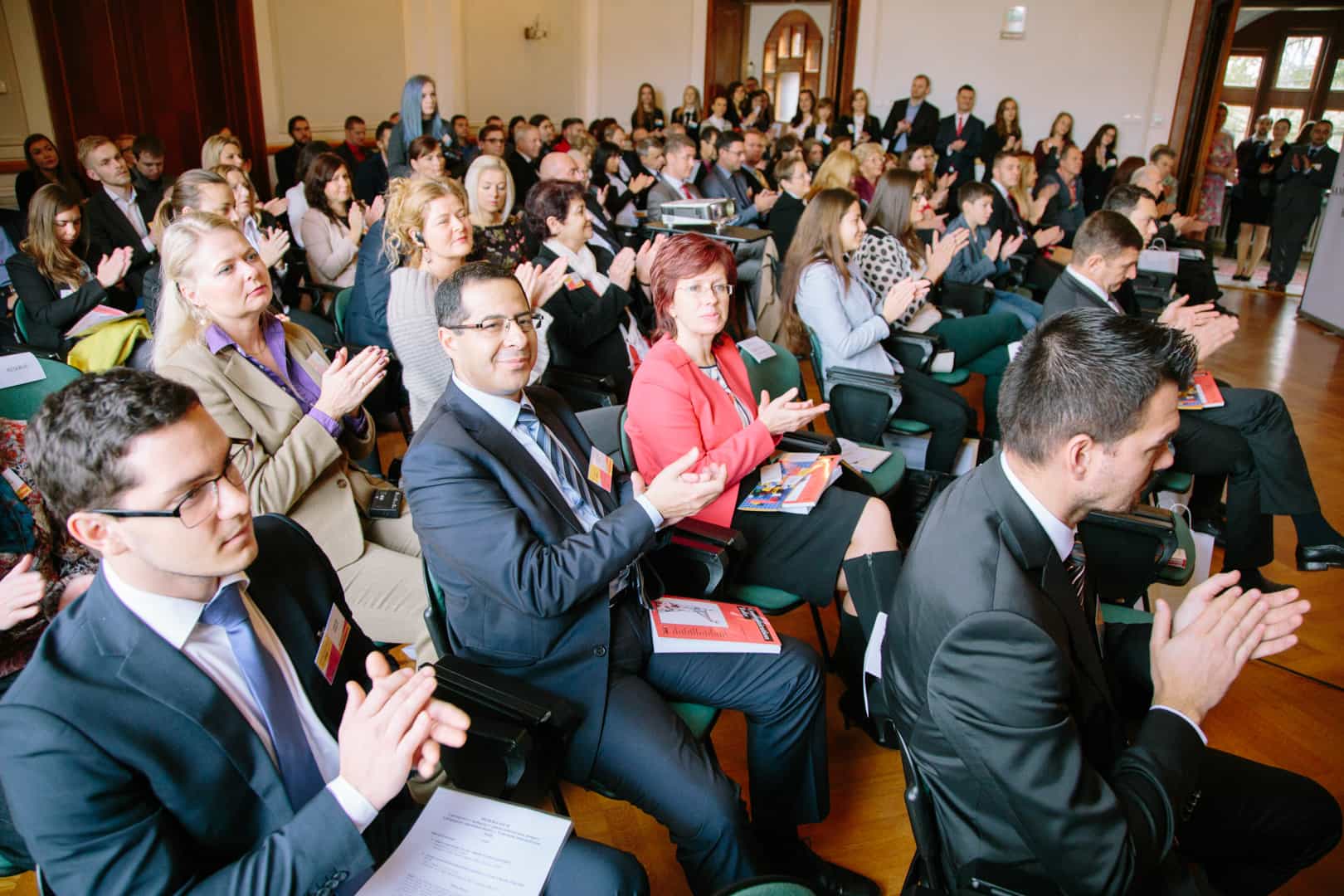
Conference Marketing Identity
The international scientific conference held annually by the Faculty of Mass Media Communication UCM in Trnava has become a traditional „autumn“ event with support and attendance of marketing communication theorists and researchers as well as media and marketing professionals. The goal of the conference is to present and exchange the current knowledge and experience reflecting marketing communication, innovations, and trends connected to them nowadays. The conference proceedings related to Marketing Identity 2013 – 2015 are indexed by Web of Science.
More information available at: www.fmk.sk/marketing-identity
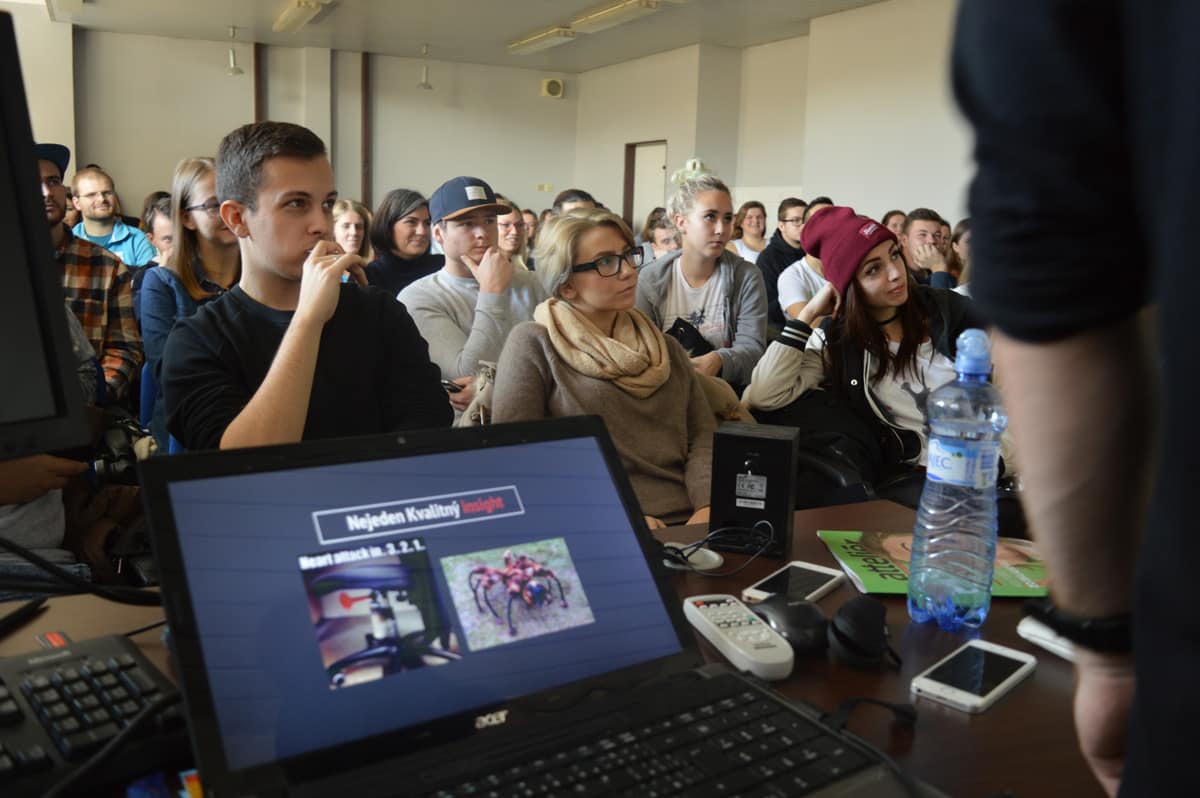
Science and Technology Week at FMK UCM
Science and Technology Week at FMK UCM
An event organized annually gives the opportunity to popularize science and technology and encourage students to their own investigation in these areas. Both teachers and students co-operate to prepare this five-day series of lectures given by professionals from media and marketing environment.
Periodicals
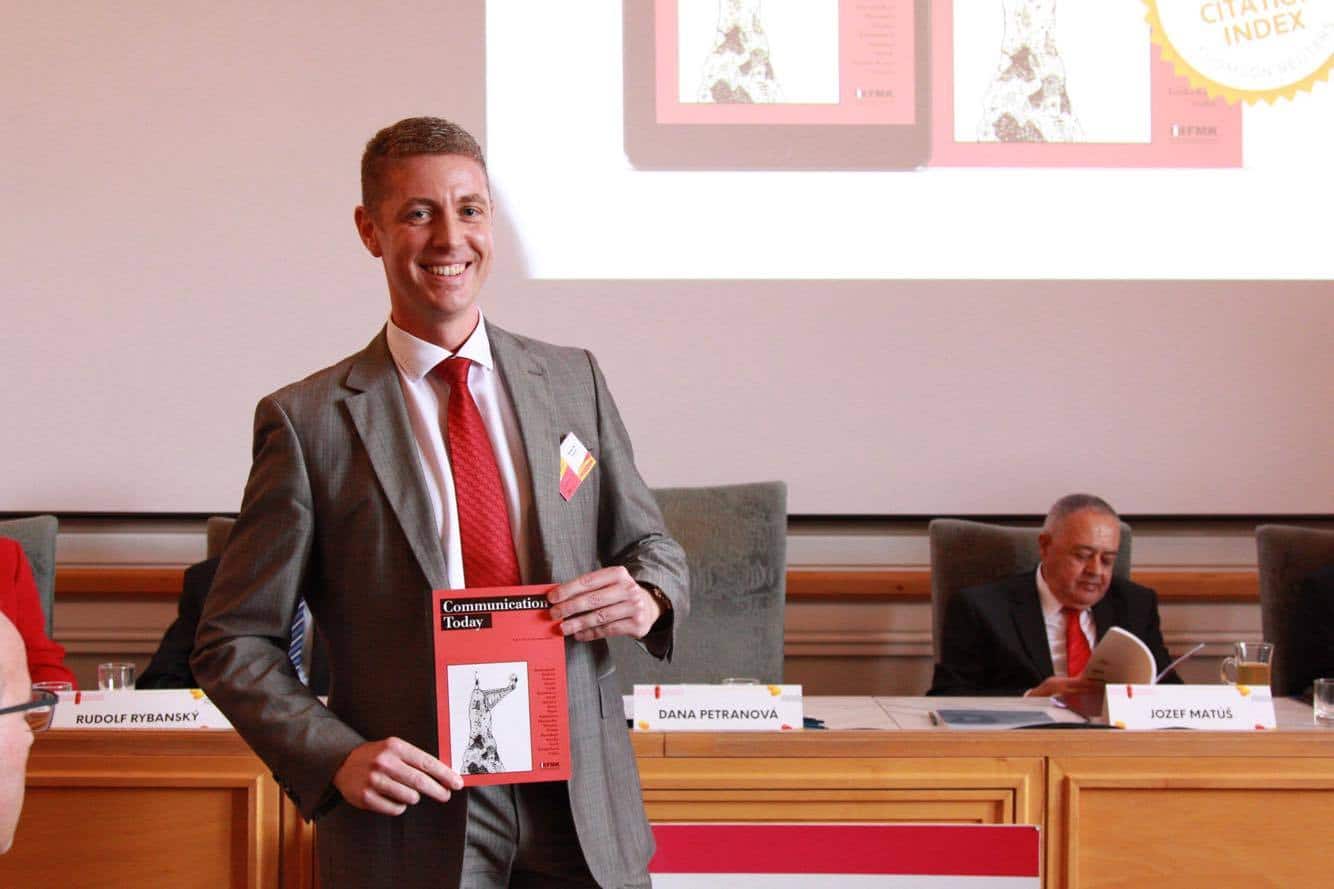
Martin Solik with the issue of Communication Today 2/2016
Communication Today
Communication Today is a scientific journal from the field of mass media and marketing communication dealing with scientific reflection of media, media competences, discourse of reality boundaries, media thinking, new media, marketing and media relations, new trends in marketing, specific types of marketing, psychology and sociology of marketing communication and consequently the structuring of communication units, marketing strategies and communication science. It offers an interdisciplinary discussion to the professional public. It is a reviewed periodical and runs with a periodicity twice a year. It provides studies of theoretical nature, theoretically-empirical character, research results and its implementation into practice, as well as reviews of professional publications.
Editorial members are members of international network European Communication Research and Education Association (ECREA).
Communication Today magazine is indexed in databases as follows: Cabell’s Directories, CEJSH, EBSCO, ProQuest, Ulrich‘s Periodicals Directory, Index Copernicus and ERIH PLUS and Emerging Sources Citation Index (ESCI) – Web of Science Core Collection.
Editor in chief: JUDr. Martin Solík, PhD.
Web page: www.communicationtoday.sk
European Journal of Media, Art and Photography
European Journal of Media, Art and Photography (EJMAP) is an art – scientific research journal from the field of mass media communication, which reflects some contemporary forms of mass media background in the context of visual
media.
EJMAP reflects some theoretical and visual aspects of interconnection and interdependency of mass media platform, including art communication, photography, film, literature and advertising, as well as some up-dated topics from photo media field, photo theory, advertising theory and visual theories in relation to picture image interpretation. It mediates the studies of theoretical, theoretical and empirical character, research results and its implementation into practice, with a focus on visualise and profiling the journal such as intermediary of mass media and intermediary issues. Ejmap magazine is a reviewed periodical and runs with a periodicity twice a year. It is indexed in CEEOL and Web of Science databases.
More information available at: www.fmk.sk/veda-a-vyskum/ejmap
Media Literacy Student Magazine
The faculty has been providing a student online magazine titles Media Literacy Student Magazine since 2013. The faculty´s professionals try to support professional and study activities of their students. The magazine offer space for publishing student works and interpretation of student activities results. With its thematic focus it covers the issue of media education and development of media literacy. The magazine supports the research and scientific activities of students and at the same time it is the platform for student discussion on topics related to the key aspects and topics of their study programme. It focuses mainly on popularization of media literacy and media education among students, teachers and other people interested in the issue. The magazine is intended not only for FMK students but also for students from other schools in Slovakia and abroad.
More information available at: www.fmk.sk/veda-a-vyskum/media-literacy-student-magazine
Almanac Muuza
Regarding the field of art the faculty has been publishing a representative selection of artistic and creative works in almanac MUUZA. The almanac in printed form includes the best literary and photographic works of students.
News
The Best University in Slovakia
Our University of Ss. Cyril and Methodius in Trnava was ranked to be the best Slovak university according to the latest, already 7th in row, international annual evaluation of world’s universities U Multirank 2020. The scoring considers 1759 higher educational institutions such as universities from 92 countries from around the globe. The ranking is done based on five different fields: learning system, research, knowledge transfer, international orientation and regional engagement. 9 Slovak universities take part in the annual evaluation, namely Trnava University, University of Economics in Bratislava, Slovak University of Technology in Bratislava, Comenius University in Bratislava, University of Ss Cyril and Methodius in Trnava, Pavol Jozef Šafárik University in Košice, University of Presov in Prešov, Catholic University in Ružomberok and Technical University of Košice. An interesting finding of this year’s research executed along with the ranking is the fact that even though more than 60 per cent of universities who were considered have taught some part of their curriculum online, only 1/3 of them were actually able to switch for online learning while the pandemic of COVID-19.Our university of UCM was one of them.
FMK sophomore Matej spreads environmental education among teachers
Web portal Fičí interviewed Matej Majerský, the ambassador of the program Young Reporters for environment. Matej educates teachers and their students about environment and how to preserve it. Matej, aged 21, is a part of the program for 5 years now and he currently works as a cooperator of the coordination team and makes video spots for the project OBJEKTív 21 which produces educational videos for schools. Matej does not only bring environment friendly ideas to students but also suggests a general change of attitude towards schooling and environmental topics as part of the mandatory curriculum. He shared more of his ideas about the topic in the interview. You can check it out on fici.sme.sk.
MLAR goes WOS
What a great news! MLAR (Media Literacy and Academic Research) is now indexed in prestigious database Web of Science Core Collection with citation index Emerging Sources Citation Index. MLAR focuses on academic reflexions on media and information literacy issues, media education and new trends in media and communication studies. The magazine has been indexed in other eminent databases such as ERIH Plus, Ulrich’s Periodical Directory, CEEOL, CEJSH, Index Copernicus. Faculty of Massmedia Communication of UCM in Trnava is the only faculty in Slovak and Czech Republic who has registered already four of their magazines (Communication Today, European Journal of Media Art and Photography, Lege Artis. Language yesterday, today and tomorrow and MLAR) in the prestigious international database Web of Science.
More than half of university students find online schooling just as valuable as F2F lectures
Students miss social interactions with their fellows. They have also reported low quality of sound and video. If it was up to students to evaluate online schooling that universities opted for during the quarantine period, they would give it an average mark, a score of 3.56. What they like about it is that they can enjoy the lectures on their own sofas at home. At the same time they perceive several disadvantages such as low quality of sound and video and they have also realized that they miss social interactions with other students. These are the data that were acknowledged by FMK researchers whom executed a nation-wide research; 679 students from 9 faculties of 6 universities in Slovakia responded to a survey with their opinion. „Faculties whom took the challenge and replaced offline lectures with online ones have proven that they are able to cope well with such an issue as lack of F2F lectures in short time. Most of the students can imagine such schooling to continue during the regular academic year, too. Comprehensibly, though, social interaction has proven to be irreplaceable. The pandemic situation learned us to profit from new possibilities that could be used in future as teaching tools for various subjects in times of emergencies or if some students need special treatment due to any issues,“ says the dean of FMK in Trnava, Ľudmila Čábyová.
Thank you!
The end of the month of March is inherently connected to Teachers‘ Day without whom our schools would not be able to operate. Dear teachers, we wish you all the best, good health in these difficult times, success at work, clever students and pleasant family time.
The first online doctoral conference
In early April, a traditional conference of PhD students and young scientists, Quo Vadis Mass Media & Marketing, was held. For the first time, the conference was held online and even this year, it was not lacking in excellent speakers such as investigative journalist Adam Valček, branding expert Pavol Minár or celebrity reporter Barbora Sosková. The whole record of the conference can be found on the social network Facebook.
Quo Vadis 2020 – prvá doktorandská online konferencia
FMK UCM v Trnave prináša v čase mimoriadnych opatrení súvisiacich so šírením koronavírusu ONLINE KONFERENCIU určenú nielen pre doktorandov a mladých vedeckých pracovníkov, ale aj pre všetkých #fmkpeople, ktorí sa chcú niečo nové dozvedieť, naučiť či kreatívne stráviť čas #doma. ? Live Stream začína o 9:00
Uverejnil používateľ Alexandra Alföldiová Streda 1. apríla 2020
Megatrends & Media 2020
The traditional spring conference is here but this year, it will be, unusually, without the
Smolenice Castle. In these difficult times, we have decided to take advantage of all the
possibilities that modern technology offers us and to organize the international scientific
conference on April 22 by way of online streaming from our homes.
The Dean’s measures regarding coronavirus
In the meantime, the teaching process will take the form of self-study, the distance or other appropriate method as determined by the teacher. The teaching for non-finishing students will run until June 6 and the exam period will be from June 8 to July 18.
The expected date of the Master’s State Exams: Jun
The expected date of the Bachelor’s State Exams: second half of July
This year’s state exams will be held online. More information for you will be published shortly. Follow the faculty website.
Teachers plan their lectures and seminars via Google Meet in FMK Virtual Calendar. We teach more than 300 lessons a week online. We believe as well that our online archive will make it easier for you to teach and carry out your scientific work while working from home.
Unicon 2020
Check out the selection of the best moments of the fifth annual festival of games, e-sport and
virtual reality which took place in the Auditorium at the turn of February and March.
Academic Club
A new, modern space has been built on the ground floor of the Herda building. It will serve
for meetings of boards, discussions and meetings of university staff.
The first ONLINE conference of doctoral students
2nd April 2020 ONLINE stream
Other News
9th November 2019 Read more.
Kids University DUCM
4th July 2019 Last week, our university hosted students of elementary and grammar schools.
Admission tests – done!
11th June 2019 Almost 700 applicants took place at admission testing on June the 11th at our faculty FMK.
Elementary school students took part in workshop on school magazines creation
7th June 2019 FMK faculty invited young journalists to help them increase the quality of their school magazines.
Students made a video that calls public’s attention to issues of media education
4th June 2019 Students of MassMedia communication at FMK UCM in Trnava created a unique video.
Our students created 6 unique games
25th May 2019 Studying program Theory of Digital Games is not just the theory. A part of it deals with creation of digital games for real business. Students create games and gaming prototypes during so-called Game Jams. Game James have a set theme and limited time for a game creation. Real and playable games are sometimes created in less than 48 hours.
UCM has just become a member of the organization Scholars at Risk that fights for academic rights
21st May 2019 International association SAR, that protects academic ideas and spreads them in the society has recently created its branch in Slovakia. UCM has become one of its five founding members.
Key areas of interest: mass media communication, marketing communication, media education, artistic communication, digital games.
Departments
- Department of Mass Media Communication
- Department of Marketing Communication
- Department of Artistic Communication
- Department of Media Education
- Department of Digital Games
- Department of Linguistic Communication
More information about faculty:
Faculty Media:
